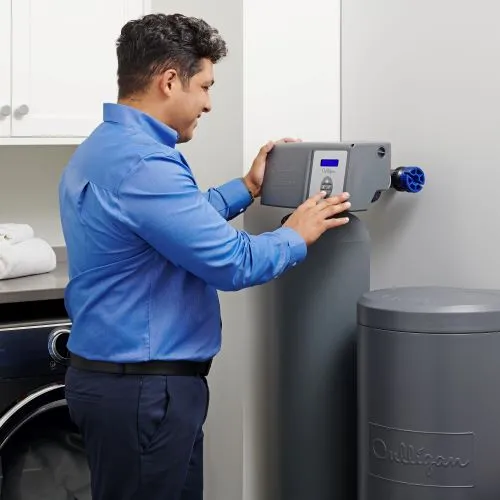Once you install a water softener, you’ll immediately notice improvements in your home’s water quality. Hard water—rich in minerals like calcium and magnesium—interferes with cleaning and causes buildup. Soft water solves this problem, allowing soaps to lather better and leave less residue. You’ll see cleaner dishes, spot-free glassware, and shinier bathroom surfaces.
Besides the visual improvement, you’ll feel a difference too. Soft water is gentler on your skin and hair. Showering in it leaves you feeling smoother and less dry. Plus, you’ll need less shampoo, soap, and detergent, which saves money over time.
Your Appliances Will Last Longer
Hard water deposits mineral buildup inside household appliances, shortening their lifespan and decreasing efficiency. With a water softener installed, appliances like dishwashers, washing machines, and water heaters work more efficiently. You’ll notice:
- Reduced maintenance needs: Less scale buildup means fewer service calls and repairs.
- Energy savings: Soft water heats faster, so your water heater uses less energy.
- Extended appliance life: Appliances last longer when they’re not clogged with minerals.
These improvements not only lower utility bills but also protect your investments.
Adjustments to Your Daily Routine
Using a water softener means small adjustments in your household routine. Here’s what to expect:
- Less soap and detergent: You’ll use less laundry detergent and dish soap because soft water enhances their cleaning power.
- Silky water feel: Some people describe soft water as feeling “slippery” or “silky.” This sensation comes from soap rinsing off more effectively.
- Softer laundry: Clothes washed in soft water feel softer and last longer since fibers aren’t damaged by mineral deposits.
These changes are easy to adapt to and offer long-term benefits.
Regular Maintenance for Optimal Performance
A water softener doesn’t require daily maintenance, but a few routine tasks will keep it running efficiently:
- Check salt levels: The system relies on salt to regenerate the resin beads that remove minerals. Check the brine tank every few weeks and refill with appropriate salt when necessary.
- Annual system cleaning: Over time, your brine tank may accumulate sludge or salt bridges. Cleaning it annually prevents malfunctions.
- Monitor water hardness: Regularly test your home’s water hardness to confirm the softener is working correctly.
Proper maintenance ensures consistent water quality and extends the lifespan of your system.
Will Soft Water Affect Plumbing?
Yes, but in a good way. Over time, soft water can help dissolve existing scale buildup in your pipes, improving water flow and reducing plumbing issues. Your pipes and fixtures will stay cleaner, and you’ll likely notice better water pressure.
Common Concerns
Is Softened Water Safe to Drink?
Softened water is safe to drink, but it contains slightly more sodium due to the ion exchange process. If you’re on a low-sodium diet, consult your doctor. Alternatively, consider using a separate tap for drinking water that bypasses the softener.
How Quickly Will I Notice Changes?
Many homeowners see immediate improvements in water quality, especially with cleaning and lathering. However, it may take a few days for residual hard water to fully clear from your plumbing system.
Does a Water Softener Require Professional Servicing?
Most routine maintenance can be handled yourself, but it’s wise to have a professional check your system annually to ensure it’s operating efficiently.
Can a Water Softener Remove Iron?
A standard water softener can remove small amounts of iron, but high levels of iron in water require specialized treatment. If you suspect iron issues, get your water tested.
Why It’s Worth the Investment
Installing a water softener isn’t just about convenience it’s about protecting your home and health. Soft water means fewer repairs, longer-lasting appliances, and smoother skin and hair. Plus, it improves the taste of water for cooking and cleaning.
For more information on home improvements and water solutions, check out trusted resources like IPTV Monster and USA Time Magazine.
Conclusion
A water softener offers numerous benefits, from softer skin and hair to brighter laundry, improved appliance efficiency, and reduced plumbing issues. While it may take some time to adjust to the feel of softened water, the overall improvements in your home’s water quality and functionality are undeniable. Regular maintenance ensures your system continues to deliver these benefits for years to come.
By understanding what to expect after getting a water softener, you can fully appreciate the positive changes it brings to your home and daily life.
FAQs
How often should I add salt to my water softener?
Every 6 to 8 weeks, depending on water usage and hardness.
Why does soft water feel slippery?
Soft water rinses soap off your skin more thoroughly, creating a slick feeling.
Can a water softener remove chlorine?
No, a water softener removes minerals, not chlorine. For chlorine removal, consider a whole-house filter.
Will a water softener help with hair and skin dryness?
Yes, soft water can reduce dryness by preventing mineral buildup on skin and hair.
